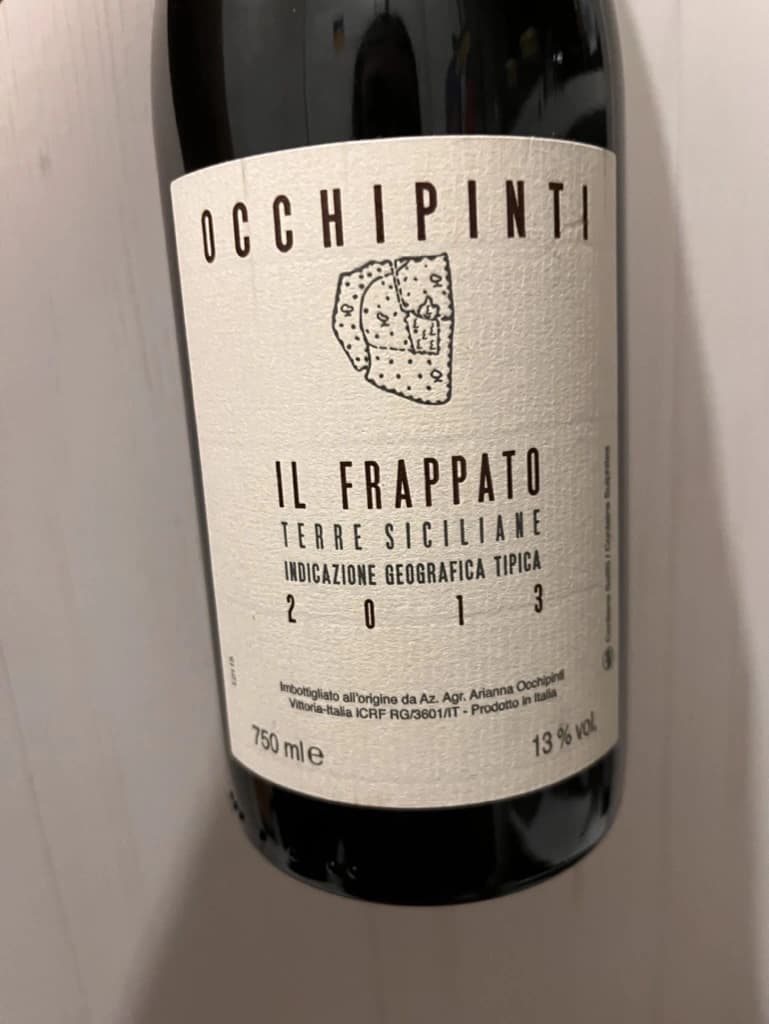Arianna Occhipinti Il Frappato 2013
- Region
- Italy » Sicilia » IGP Terre Siciliane
- Type
- red still, dry
- Producer
- Vintage
- 2013
- Grapes
- Frappato
- Alcohol
- 13
- Sugar
- 0.2
- Volume
- 750 mL
- Cellar
- not available

Il Frappato stems from a dream which I had when I was a girl to make a wine that knows the land that I work, the air I breath, and my own thoughts. It is bitter, bloody and elegant. That is Vittoria and the Iblei Mountains. It is the wine that most resembles me, brave, original and rebellious. But not only. It has peasant origins, for this it loves its roots and the past that it brings in; but, at the same time, it is able to fight to improve itself. It knows refinement without forgetting itself.
Il Frappato is 100% Frappato from 40-years old vines growing on red sands and chalk soils. The grapes are destemmed and macerated for 30 days and then aged for 14 months in large 25hl Slavonian oak barrels.
Ratings
Honestly, I see no point in describing this wine. Aye, I am overly subjective here, but this is my personal drug. Still alive, still rocks. The cherry is already part of the confiture. The red flowers blossom. And I walk in the forest after the rain picking up mushrooms. Dog rose? Yes! Tar? Yes! Unfortunately, this is my last bottle of this vintage.
What an incredible evolution of Frappato! Complex and sexy result. Cherry confiture, peonies, rosewater-flavoured lokum, dog rose, balsamic notes, tar, and mushrooms. Round, almost perfectly balanced, and delicate palate that still shows some energy. Mediun+ tannin is mature and well-integrated, and mediun+ acidity that adds juiciness. Long and flavourful aftertaste. Bravo! It's pure enjoyment.
We jokingly called it a bastard of good Burgundy and old Aglianico.
About Producer
Arianna Occhipinti is a winemaker from Vittoria who founded her own winery in 2004, bottled her first commercial vintage in 2006 and today works exclusively with estate fruit. She embraced winemaking thanks to her uncle, Guisto Occhipinti, proprietor of Vittoria's most famous winery, COS. At the age of 16 years, Arianna started to help him in the cellars. She loved this experience so much that her future connected to wine tightly.
After graduating from oenology school, Arianna started with only 1 hectare of abandoned vines attached to a family vacation house. Over the years, she acquired 25 hectares featuring only autochthonous varieties - 50% Frappato, 35% Nero d'Avola and 15% white varieties Albanello and Zibibbo. Almost all vines are young because Arianna planted them on her own. But she also added to her holdings 60 years old albarello-trained vines, which she initially rented.
Not irrigating, harvesting late and not using fertilizers are the secret to making more elegant wines in the area. The freshness and minerality in my wines come from the subsoils. Any wine made from young vines or chemically grown vines feeding only off of the top soil will have the cooked, hot characteristics people associate with wine from warm regions.
These days Arianna Occhipinti is famous as a biodynamic winemaker. There is zero irrigation in her vineyards in this hot, windy climate! To protect the vines, she grows cover crops (like fava beans) and other plants between every other row. Arianna tries to minimize intervention in the winemaking process.
Arianna is regarded as a symbol of success in the world of Biodynamic Farming and Natural Wine Making. She has remained committed to those principles while evolving from her originally more dogmatic outlook. Below is her response to importer Jules Dressner's question about her feeling about the term "natural wine":
I make natural wine, but this is a term I'm beginning to be less and less comfortable with, because its implications are very complicated. I really want to stress that my main goal is to make a good wine that reflects where it comes from, and for me the only way to successfully do this is to make the wine naturally. When I first started, people were just starting to talk about natural wine. It was very important to me to think about all these issues, and in those early years I definitely had a more militant attitude about it. Making natural wine was a mission, something worth fighting for. Now that I've grown up a little bit, the mission is making wine of terroir. You have to respect the vineyards, and nature in general. When I wake up in the morning, I want to feel free. Making this wine is my opportunity to feel free. So again, my goal is not to make natural wine, working this way is a process to make good wine.